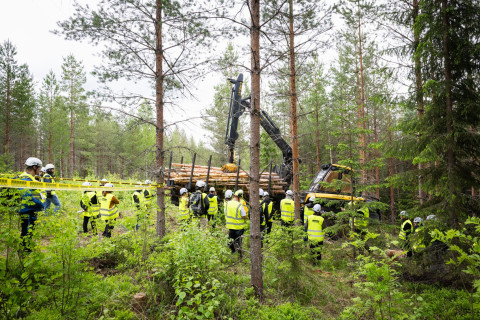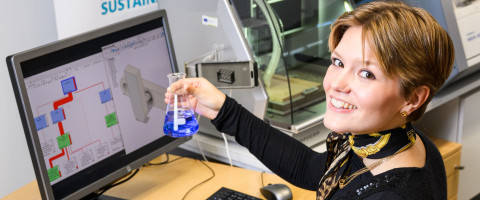The School of Forest Sciences is an internationally renowned research and education unit. We educate specialists for jobs in the forestry and environmental field.
We offer scientific postgraduate education in the doctoral programme in Science, Forestry and Technology (LUMETO). Two thirds of the students are international students. The international reach of the programme is further enhanced by exchange students and other visitors – over 100 international students or researchers work yearly at our university.
Our main fields of research are forest ecology, forest management, forest planning, remote sensing forests with laser scanning, logistics of logging, and wood materials science.
Joensuu is one of the most important forest know-how clusters in the world. Our partners Natural Resources Institute Finland Joensuu, European Forest Institute, and Karelia University of Applied Sciences are also located in here in Joensuu.
The School of Forest Sciences constitutes part of the Faculty of Science, Forestry and Technology.
130
annual enrollment of students
180
international scientific articles annually
120
experts and professionals
Studies
Whether you intend to work as a local expect on forestry or as an internationally respected leader, you will get the best possible education here. We emphasize the importance of having a holistic perspective on forests, sustainable use of natural resources, and on developing protection of forest environments. Our education programme in forest sciences is internationally renowned, and Finnish forest expertise is sought after.
You can specialize in forest management and forest ecosystems; forest, energy and wood technology; forest mensuration and planning; and in forest economics and politics. The Master’s degree studies can be done in English, as well, in our international Master’s degree programmes.
The forestry experts graduating from the University of Eastern Finland are employed in various planning and development roles, or as entrepreneurs in the field. Our multidisciplinary degree prepares our students for work roles in other fields related to forests and the environment.
Bachelor's and Master's degree programmes (in Finnish)
Doctoral programme and specialist training programmes
Research
Our research is of high quality internationally, and is focused on forests, forestry, and the significance of forests in a society. It is associated with the research done on environment and renewable resources, which is one of the core strengths of our university.
Forest zones cross borders and forest industry operates globally. Forest researchers have always sought international contacts, because local forestry no longer exists. Climate change and biodiversity loss is relevant to all of us. Our research collaborations are close, and often the same problem is studied by several disciplines.
We participate in multiple projects financed by the EU, and our research and development partnerships include many companies and practical organizations. Our researchers participate in the product development of the forest sector and university-business cooperation with other natural resource sector actors.
Our research areas
Our research themes deal with forests and their role in the society. In broad context we carry out research on the environment and renewable natural resources, which is one of the four strategic research areas of excellence at the University of Eastern Finland. Our researchers have multidisciplinary approach and collaboration with international, national and local actors play a significant role in our activities.
Forest information technology covers topics ranging from applied geoinformatics to information technology (IT) -methods applied to forestry. Since geographical information system (GIS) technology is now an important part of the operational work and data management of the forest industry; understanding modern IT technology and the ability to design new GIS tools are also important parts of the work of forestry professionals.
Forest mensuration science includes mensuration, modelling, and inventory methods as well as remote sensing techniques. Forest mensuration and planning concentrates on the interrelated processes ranging from the forest inventory to the decision-making in forest management and use of forest resources. Forest planning analyses alternative forest management options using forest inventory data and models developed by forest research. A central task of planning is to predict the consequences of management alternatives, so that treatments that best fulfil the objectives of forest owners and other stakeholders are applied.
Modern forestry is multi-functional and therefore management objectives may include non-timber benefits such as amenities, biodiversity conservation, and some environmental effects possible through forestry operations. Various optimization methods can be used to schedule the best treatments for forest stands.
The research focus in forest management and ecosystem services is on how the management and utilization of forests and changing climate affect the carbon dynamics, structure of forests and different ecosystem services and various risks to forests. Forest biomass production and carbon sequestration are studied as well as how they are affected by natural disturbances such as storms, snow extremes and drought.
Forest health research focuses on the impacts of forest disturbances, forest microbiota and animals, and climate change to forest yield, productivity and quality of wood and non-wood products as well as ecosystem services, and on how harmful impacts can be alleviated. Many of the questions addressed in research on forest management, ecology and health are global, and both experimental studies and modelling of forest ecosystems are performed.
In forest ecology, the structure and functioning of forest ecosystems are studied, exploring patterns of forest biodiversity and the interaction between animal, plant, and fungal species. Research on forest ecology covers population and community ecology, the ecological patterns and dynamics of forest ecosystems and issues relating to conservation of forest biodiversity.
Research in forest soil science focuses on plant-soil interactions under changing climate. We apply field monitoring, experimental work, and modeling on peatlands and mineral soil forest in field and laboratory conditions. Our restoration research focuses on issues related to the restoration of forestry drained peatlands, such as impacts on biodiversity (species and functional) and greenhouse gas exchange.
Forest economics research focuses on economic production and consumption of forest-related services. Forest economics covers also multiple uses of forests and multi-objective forest planning, co-creation in forestry decision-making, and economic and social analyses of the forestry sector. Business management science analyses the competitiveness and intellectual capital of forest-related businesses and organizations.
Forest policy studies at School of Forest Sciences have a broad focus on decision making and societal governance processes, from a single forest owner to international forest policies. We are interested in societal structures enhancing – and from the other hand inhibiting – the change toward circular bioeconomy. We are studying impacts of past forest policies and potentials of new policy instruments. Topics of our studies include, for example, learning and education in bioeconomy, forest discourses, ecosystem services, and decision support methodologies enhancing pluralistic decision making.
Both forest economics and forest policy research connect to forest bioeconomy foresight, which considers change of phenomena around forest usage. The research focuses on the evolving operating environment of enterprises, the public sector, and civil society. Of interest are subtle and radical changes of forest bioeconomy as part of systemic societal transformation towards carbon-negative circular bioeconomy. We use horizon scanning, exploring modelling of alternative futures, and scenario-driven futures images. Foresight research gathers stakeholders to create and assess futures paths collaboratively, aiming at insight and improved futures thinking.
Wood procurement is the most important object of research in forest technology. The forest industry organizes the wood procurement of mills, considering its production process and the factors of the final product for the customer. Its bottlenecks include delivery volumes, productivity, environmental sustainability, costs, labor, seasonality, transportation infrastructure, ERP systems, energy efficiency, and wood purchasing.
Wood materials science and wood technology focus on timber and its various products. The research area combines wood raw materials, their property variations and products, such as sawn timber and its further processed goods, wood-based panels, papers, paperboards, wood-based textiles, chemicals, and energy. Research on materials and technologies is based on quality variations of raw material sources, wood’s environmental benefits, and its huge versatility in applications. Close collaboration with domestic or international universities, research institutes, and companies is almost a rule in research projects.
Research concerning biomass production entails the sustainable production of lignocellulosic biomass, its efficient transportation and logistics until its final utilization to produce energy. The research lines address, among others, the management of biomass production systems, including its ecological, environmental and economic dimensions, and the development and evolution of bioenergy markets and policy both at national and international level.
Our research groups and projects
Collaboration with companies
The School of Forest Sciences works in close collaboration with companies both in research and in education. Companies have the opportunity to engage in joint research projects with the School of Forest Sciences, allowing them to benefit from cutting-edge research in the field to develop their business activities.
In education, collaboration can involve, for example, guest lectures, internships and thesis projects. This way, students gain valuable practical experience, while companies have the opportunity to connect with future experts.

Laboratory
School of Forest Sciences provides laboratory services to researchers and for educational purposes. Laboratory is located at the University of Eastern Finland Joensuu campus, Borealis building. Laboratory equipment and personnel are capable of running various chemical, physical and physiological analyses and measurements on soil, plants and wood. In addition to a research laboratory, we also have a student and teaching laboratory to serve our BSc and MSc students.

News and events
News
Contact information
Head of the School of Forest Sciences is Dr. Jukka Tikkanen. Deputy Heads of the School are Prof. Dr. Jari Vauhkonen (research) and Associate Prof. Lauri Korhonen (studies).
Get acquainted with our staff in UEF Connect expert search service. In UEF Connect you can search people by name or key word.
University of Eastern Finland’s Student and Learning Services is responsible for providing general study-related administrative services for students and staff, as well as offer support for applicants.
Read more: Student and Learning Services
Postal address
University of Eastern Finland
School of Forest Sciences
P. O. Box 111
FI- 80101 Joensuu
Street address
Yliopistokatu 7
Borealis, building A, 3rd floor
Email: [email protected]

































































